It is something many businesses are dealing with in 2021. Freight shipping delays are disrupting supply chains, leading to product shortages on store shelves, and more. While the trucking industry is recovering from the early-pandemic slump, increasing demands from consumers are tightening up capacity, driving up truckload rates, and causing freight shipping delays. All of these factors are frustrating businesses and leading to headaches for transportation companies.
Freight shipping delays have become increasingly common in 2021. Freight is considered delayed when it arrives after the planned delivery date. Delayed freight might be slowed or delivery postponed because of a number of logistical factors, ranging from weather to crowded terminals to driver shortages to other unforeseen circumstances.
In some cases, dealing with freight shipping delays is just part of doing business. In other cases, a strong freight partner with a track record of guaranteed delivery can help ensure freight arrives on time, every time. See how a strategic truckload freight partner can make all the difference in avoiding delays, keeping transit times down, and ensuring a strong supply chain.
Robert Bowman, President of R+L Global Logistics, has more than 20 years of hands-on leadership experience in the logistics and transportation sector. He’s seen everything the industry has to offer, both good and bad.
"It is a fact that shipping delays have increased across the whole logistics industry. From port delays and increases in driver detention to tightened truckload capacity, freight isn’t always moving as fast as in previous times,’ Mr. Bowman said. “It’s an industry-wide trend, but it doesn’t have to hold you back. A strong truckload shipping partner can help ensure freight allows on-time, every time."
Understanding what’s the deal with freight delays involves understanding how freight moves and much more. Let’s take a look at how the industry works and what’s causing the shipment delays businesses are dealing with today.
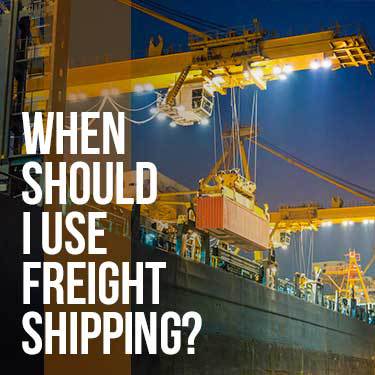
Freight shipping is necessary for large shipments of goods. If you need to move a commodity by land, air, or sea, you need freight shipping. While ocean freight and air freight are obvious, you’ll find that and freight shipping comes in two forms: truck (over the road) and rail.
Over the road freight shipping is by truck. There are two main options for freight shipping by truck: less than truckload (LTL) and full truckload. You might opt for LTL shipping if you are only moving a few pallets or crates of goods. Full truckload shipping is a great option when you need to move more. A full truckload shipment by dry van can carry up to 45,000 lbs or 26 pallets.
When should I use freight shipping? Freight shipping is a good option when you need to move a large number of items or a large item. A full truckload shipment of 26 pallets adds up quite quickly, so freight shipping is a solid choice when shipping goods or commodities for business. You’ll find that LTL shipments often range in size from 150 to 15,000 lbs and are also good options when moving goods for business.
There are many benefits to using truckload freight shipping. Freight shipping services can be scaled for your business requirements, which means a solution can be customized for your specific shipment needs. Freight shipping services are varied. You can opt for expedited freight when it needs to be there fast; refrigerated freight when it needs to stay cool; heavy haul trucking when you have an oversize or overweight shipment and much more.
Other benefits of freight shipping include access to top carriers, often-reduced shipping costs, and on-time delivery with the right partner on your side.
Shippers have many choices when seeking an LTL or FTL shipping partner. Some of the top freight shipping companies in the U.S. include:
Freight shipping is a great option when you need it. Don’t think freight shipping is for you? Parcel shipping might be a better choice if you are shipping a single item, a small number of goods, or a consumer-to-consumer shipment.
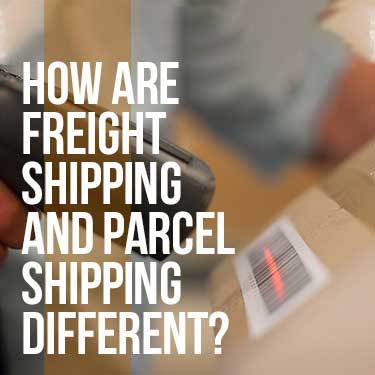
If freight shipping is for large B2B (business to business) shipments, parcel shipping might be best for B2C (business to consumer) or C2C (consumer to consumer) shipments.
Generally speaking, parcel shipping is for individually labeled boxes or envelopes going to one particular address. Parcel shipping is typically handled by carriers like the United States Postal Service (USPS), UPS, FedEx, DHL, and LaserShip, and others. Even the behemoth Internet retailer Amazon has a foot in the parcel shipping game, as many consumers see their orders delivered on Amazon vans.
In the most general terms, any shipment that weighs less than 150 lbs can be handled by a parcel shipper. Most parcel carriers prefer shipments under 70 lbs, though. Parcels are generally not shipped on pallets or in crates.
Freight shipping is almost exclusively reserved for business transactions and shipping. Most consumers don’t have a need to freight shipping for their day-to-day transactions, unless they are moving very, very large goods. Parcel shipping is usually reserved for goods on the very last links of the supply chain and is sometimes referred to as last-mile delivery.
There are many caveats to using parcel shipping for a large shipment. Parcel shipping can be more expensive than freight shipping, especially for large crated or palletized shipments. Additionally, large shipments of multiple items going to the same address are often best combined into a single crate or pallet to reduce delivery errors and help ensure packages are not lost in transit.
One thing that parcel and freight shippers have in common in today’s economic and commerce marketplace is marked delays. Parcel shippers are facing delays due to many economic, public health, commercial, and even political factors.
Consumers spent nearly $200 billion online for the 2020 winter holiday season and all these orders definitely put pressure on parcel carriers.
For example, USPS customers saw significant delays for mail and parcels in December 2020 and January 2021. The reasons for the delays varied, but were largely related to the COVID-19 pandemic. According to a report from The Washington Post, USPS customers were seeing significant delays for mail and parcel shipments as 19,000 of its 644,000 employees were unable to work because they were quarantined due to infection or exposure to the coronavirus in late December. Government funding cuts also could have impacted USPS delays.
Additionally, in December 2020, huge volumes of online and e-commerce shipments overwhelmed the systems in place, causing backlogs and more for parcel shippers. Reports indicate that some UPS drivers were told to stop picking up shipments from major U.S. retailers including Macy’s, Gap, and Nike to prevent further backlog.
The backlog of parcel shipments, reduced shipping company staff, and other factors mean that some consumers are still waiting for holiday packages to arrive in 2021.

Sometimes speed is of the essence when shipping freight. Sometimes it is more important that it get there than when it gets there. Regardless, you might be wondering if freight shipping is fast.
For most shipments, freight shipping transit time depends on the pickup and delivery locations. It will obviously take your over-the-road truckload freight shipment more time to cross the country than to travel across town.
In addition to distance, other factors can impact the speed and timeliness of your freight shipment. Shipping mode, weather, truck capacity, and shipping season can influence the speed of your freight shipment:
There’s a lot to pay attention to when thinking about the speed of freight shipping. A strategic freight partner can likely help you overcome the challenges that can slow freight shipping and ensure timely delivery for each shipment.
Did you know USA Truckload Shipping, powered by R+L Global Logistics, is ready to be your strategic partner for shipping all kinds of freight? Let us handle everything from freight shipping fiberglass parts to bulk liquid transport.
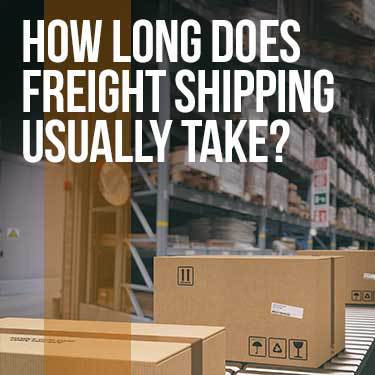
How long does freight shipping usually take? Well, it depends. As noted above, the speed of freight shipping can be impacted by many factors. Distance, shipping mode, weather, truck capacity, and even the time of year might all play a role in how long freight shipping takes.
Need to put the length of time a freight shipment might take into numbers? Depending on the distance and other factors, an expedited truckload freight shipment might take as little as 1-3 days. A regular freight shipment needs a little more time and might take as little as a couple of days or as much as a couple of weeks based on the variables.
Another thing to keep in mind when considering how long freight shipping takes is that carriers and consumers might measure time differently. For example, let’s say you got a freight quote for a 3-day truckload shipment on a Wednesday. That means your freight will be there Saturday, right? Well, not necessarily. In fact, it might break down like this:
In the scenario above, the freight took a week for a 3-day shipment and isn’t even considered delayed. While this situation might not apply to your shipment, it is something to keep in mind.
The best way to determine how long freight shipping takes is to be open and communicative with your freight broker or carrier partner. The right freight partner will give you access to 24/7 tracking and have friendly agents available to show you transparency each mile of your freight’s journey. Your freight partner should be able to provide information about pickup time, planned transit time, delivery time, and even provide delivery confirmation.
Even with a strategic freight partner on your side, shipments can be delayed for many reasons. Let’s learn more about shipment delays and how a delay might impact the movement and delivery of your freight.

A shipment delay, or freight delay, occurs when your freight shipment arrives after the originally planned delivery date. Delayed shipments might be hours late, a few days late, or even further behind depending on your individual situation. There are a number of causes for freight delays and in many cases, shippers and carriers have no control over the delay.
All kinds of logistical factors can cause freight shipping delays. Some of the circumstances causing freight shipping delays in 2021 include:
With so many factors causing freight shipping delays, it is easy to see why delayed freight has become a problem for many businesses.

Delay in delivery simply means your freight shipment is running late. A delay in delivery is when your freight shipment arrives after the originally intended date or time of arrival.
Delays in delivery can be fairly minor, like when your freight is just a few hours late. Delays in delivery can also be even more inconvenient, like when your freight is days or weeks late.
Shipping delays can occur for many reasons with almost any shipment. You might anticipate a delayed shipment by watching tracking information as your freight shipment moves and noticing it is taking longer than expected. A delay in delivery might occur when there is a problem with the last-mile portion of the shipping process.
Delays in delivery and freight shipping delays are increasing concerns for many of today’s businesses. Let’s further break down what’s causing the increased freight delays, the effects of late delivery, and more.
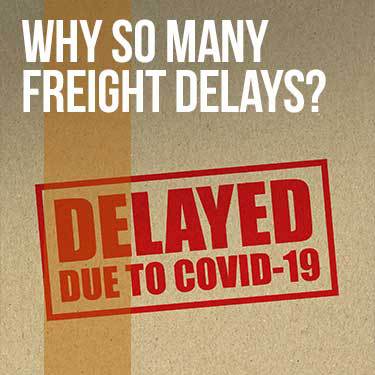
What are there so many freight delays? Many businesses have found that today’s shipping marketplace has created a perfect storm of factors causing freight delays.
There are a wide range of factors influencing delays in delivery and freight delays. These factors include everything from the ongoing COVID-19 (coronavirus) pandemic to disrupted supply chains to shortages of truck drivers on the road today. Let’s take a closer look at these factors.
The coronavirus pandemic has taken a serious toll on today’s transportation industry. According to information reported by Statista, the coronavirus (COVID-19) pandemic has caused problems for the transportation and logistics industry worldwide. In the first few months of 2020, the transportation and freight forwarding market was up 2.5% compared to the previous annual period. As 2020 wrapped up, the transportation and freight forwarding market was down -7.5% over the same time last year. This indicates a severe impact. This server impact includes problems like freight delays and more.
Disrupted supply chains are causing freight delays. Manufacturers in the United States and around the world are seeing disruptions to their supply chains in all stages of production. Many manufacturers began looking for new sources for products and components in early 2020 and still struggle to maintain alternative sourcing strategies into 2021. This might mean manufacturers are struggling to find the materials needed to produce goods, which means retailers might not be able to stock shelves with in-demand products. These supply and demand problems can equal delays for shippers due to non-availability of commodities and more.
Additionally, the transportation and trucking industries have been facing a shortage of qualified drivers in recent years. This problem was only amplified by the coronavirus (COVID-19) outbreak. As of 2019, the average commercial truck driver’s age was 55 years old. This means many truck drivers are approaching retirement age. Younger drivers simply aren’t entering the industry today as they had in years past. For many, the truck driver lifestyle is unappealing. For those interested in the industry, 2020 brought temporary and permanent closures of CDL schools. This further impacted a nationwide driver shortage.
These factors, along with other contributing issues, have all added up to an increased number of freight delays.

The effects of late delivery of goods are wide-ranging. Effects of late delivery might range from simple inconveniences to headaches with scheduling to delayed production to much, much more. Late deliveries can even be deadly in extreme cases, especially when it comes to deliveries of critical, life-saving medical supplies.
For some businesses, though, the effects of late delivery of goods can tarnish their reputation in an already-saturated marketplace. Late deliveries might suggest poor performance to your customers, bring down your business reputation, lead to poor reviews, increase calls for support, lead to customer churn or lost business, and seriously impact your bottom line.
In many cases, freight shippers are left accountable for delays even when the problem is out of their hands. Freight delays often even extend past the reach of carriers. Delays can be caused by factors that are simply out of human or business control.
Freight delays and late delivery of goods can wreak havoc on B2B and B2C markets. On a consumer level, reports suggest that 29% of consumers will stop doing business with a company after just 1 delivery problem. The same report indicated that 62% of consumers are less likely to make future purchases from a company when their shipment arrives 2 or more days late.
While the numbers above are specific to B2C shipments, the same sentiment might apply to B2B shipments. Purchasing agents are human too, and this means they might be less apt to purchase goods for their company when they’ve had negative shipping experiences from another company.
With all this in mind, you might deduce that the most impactful effect of late delivery of goods is decreased revenue. If your shipment doesn’t arrive on time in either a B2C or B2C setting, you might be more likely to experience customer churn and see a decrease in sales.

The consequences of late freight delivery can vary from shipment to shipment and from commodity to commodity.
For example, a hospital that receives a late shipment of ventilators during a global respiratory virus pandemic will likely suffer more consequences than a toy store that experiences a freight delay on a shipment of dolls. In the first case, patients might suffer or even die. In the second case, shoppers might be inconvenienced by empty shelves.
Though the gravity of situations can vary, all freight delays have a few things in common.
If late freight delivery is a consistent problem for your business, it might be wise to evaluate how your shipping partner is impacting your customer retention rate (CRR). Sure, you might be getting a great deal, but you also might be getting subpar and cut-rate freight shipping service.
Your CRR might depend on timely delivery of goods. If customers are frequently let down by late freight delivery, your retention rate might plummet. Loyal customers tend to be the most valuable customers over time and retaining them will likely help your business grow. In fact, a classic business adage implies that loyal customers are worth more than 10 times the value of their first purchase. Retaining customers by working with a freight partner who provides on-time delivery is a smart choice for your business. A major consequence of consistent late freight delivery is losing these valuable customers.
Now that you know more about how freight delays and late freight delivery can impact your business, let’s dive into some of the causes of freight delays.

There are many factors that might cause delays in shipment. Today’s freight shippers are facing a quagmire of shipping concerns, ranging from problems caused by the ongoing COVID-19 pandemic to port congestion to supply chain disruption.
With so many determinants playing an influential role in freight shipment delays, it is easy to see why shippers and businesses are frustrated with the current situation. Businesses can be seriously affected by late freight shipments. Customer retention rate can drop with delayed shipments and consumers can get frustrated when late freight affects the availability of in-demand products.
What causes a delay in a shipment? Factors that can cause freight delays include:
Let’s take an in-depth look at each of these factors to determine why your freight shipment might be delayed or on hold.

COVID-19 is an infectious disease caused by the coronavirus. The World Health Organization declared COVID-19 a pandemic on March 11, 2020, and few things have been the same since. As of mid-January 2021, nearly 400,000 people in the U.S. have died from COVID-19.
COVID-19 is also a significant cause of freight shipping delays. As of mid-January 2021, more than 24 million Americans have been sickened by the coronavirus. Just like other industries, the transportation industry has been severely impacted by the virus with lost time and a limited workforce.
Additionally, the COVID-19 pandemic has led to reduced spending power among both businesses and consumers; increased precautions and limitations on international shipments; reduced freight capacity; and more. These factors related to COVID-19 have caused shipping delays and impacted how freight moves across the country.
The COVID-19 pandemic also put U.S. demand for goods and materials from China on full display. Ports and borders closed and shipments allowed through required quarantine. This also slowed freight and caused shipping delays on imported goods.
All of the above elements add up to freight shipping delays caused by COVID 19. Members of the transportation industry and shippers alike are monitoring the COVID-19 situation day by day and month by month, as the global economy and U.S. transportation marketplace depend on it.
Interestingly enough, data from the American Journal of Transportation suggests that while regular over-the-road freight shipping has been slowed or delayed by the coronavirus, expedited shipping lanes remain open and moving fast. However, the journal recommends that expedited freight shipping remain reserved for the most urgent deliveries.
Does the type of freight or commodity you’re shipping cause freight delays? It certainly can.
Some commodities, including things like HAZMAT and heavy haul shipments, require extra attention, details, and documentation that can add up to extra time. Problems with permitting and more can lead to shipping delays and slow movement over the road.
Other commodities have restrictions on freight shipping, too. For example, if you’re shipping alcohol in bulk quantities, you’ll need to ensure you’ll need to make sure all state regulations are met. This can slow your shipment and lead to freight delays. If your freight has a heartbeat, you’ll likely need to follow transportation regulations around shipping livestock and animals. This can also cause delays,
Additionally, if your freight is coming from overseas, the customs clearance process might delay your shipment at the port. Every last detail needs to be perfect in order to clear customs. Customs bonds, Bills of Lading, labeling, government approval, and other particulars need to be in perfect alignment to be allowed into the country. If there is any kind of problem, this means your imported goods might be delayed at the port even before they make it on the freight truck.

Does weather cause freight shipping delays? Yes, it can in certain situations. Weather can be unpredictable and severe weather can lead to major delays.
The most obvious problem with severe weather and freight shipping is that trucks simply are not safe on the roads during the most severe weather. Your carrier is only allowed so many hours of service behind the wheel between rests, and these hours can be burned through when drivers are idling waiting for floods to clear, ice to melt, or torrential rain to stop. All of these weather conditions can slow your shipment and lead to freight delays.
Not only can trucks not safely travel over the road during inclement weather, but other weather-related factors can impact the time your shipment takes. Some other weather-related factors to consider include:
Weather is a major contributor in the world of freight shipping delays, and unfortunately, your carrier has no control over it -- whether the weather is hot or whether the weather is cold and everything in between.
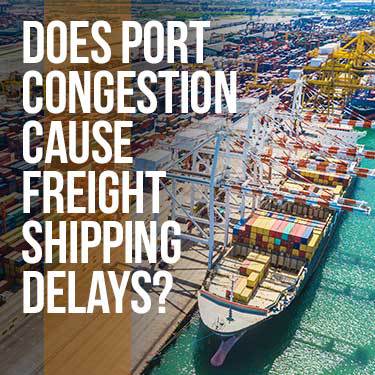
It can be difficult for carriers to navigate crowded ports. This means port congestion can cause freight shipping delays.
Drivers can spend hours in line at crowded ports. In fact, drivers told DAT in a recent survey that they commonly spend up to 3 hours waiting for cargo at the most crowded ports. Wait times at the country’s busiest ports, like those in the Los Angeles area and in New Jersey, meet or exceed the two-hour mark.
And because this time waiting is spent behind the wheel, the hours idling at a congested port can burn through a driver’s hours of service allowed for the day. This adds up to delayed freight for drayage shipments and more.
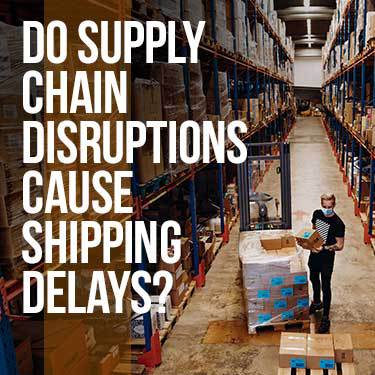
Supply chain disruptions are a major factor behind shipping delays. In today’s current economic conditions, supply chains are being disrupted by problems caused by COVID-19 and more.
Retailers, warehouses, and manufacturers located all across the U.S. continue to face low inventory levels due to supply chain disruption.
Five common causes of supply chain disruptions include:
Unfortunately, suppliers have seen examples of every single cause above occur over recent years and months. Technologies are constantly changing and keeping up can be a challenge to suppliers. The COVID-19 pandemic caused trade restrictions that seriously impacted supply chains. The pandemic has made planning and forecasting very difficult, leading to unintended inaccuracies. Tariff and taxation changes under the Trump administration altered the cost of doing business. And finally, reduced truckload capacity has caused changes in transport costs for many.
All of these things can add up to a disrupted supply chain, which can lead to freight delays for all kinds of shippers.

Can low available capacity cause freight shipping delays? Absolutely. In fact, low truck capacity might be among the leading causes of freight shipping delays as we move into 2021.
Low truck capacity causes freight delays in the most basic way. Simply put, if a truck isn’t available to move your freight right away, the shipment might be delayed until a truck is available.
What’s causing low truck capacity? There are a number of factors influencing the available trucks and drivers on the roads today.
A few of the aspects of tightened truck capacity include:
All of the above circumstances add up to fewer available drivers and fewer available trucks on the road today. Fewer available trucks means more likely freight shipping delays.
The capacity crunch is also driving up freight prices. We put together a list of 15 easy easy ways to reduce freight costs to help your shipping budget stay in the black.

Just like a congested port can cause freight delays, backed-up trucking terminals can cause delays, too.
If you’re shipping LTL freight, it travels from terminal to terminal to get to its ultimate destination. These terminals are like a hub and spoke system, which the main terminal or headquarters serving as the hub and the smaller terminals serving as the spokes.
Peak shipping season can cause both the hub and the spokes to become backed up. A large amount of freight might be filtering its way through the system, leading to delays for LTL freight shipments. If one of the spokes falls behind, it can cause a chain reaction that delays other spokes in the system.
Backed-up terminals can lead to freight shipping delays, especially for LTL freight.

Driver detention can also be a cause of freight shipping delay. What is driver detention? Driver detention is when a driver or carrier experiences a delay along the way. Driver detention can occur at the point of pick up or at the final delivery location.
If the driver's detention is your fault, maybe because your freight wasn’t ready to go or you weren’t ready to accept delivery, you might be on the hook for extra fees. There’s more to it, though. Driver detention can lead to greater freight delay overall because of a snowball effect.
The following problems might stem from driver detention:
All of the above factors can add up to serious shipping delays. This is why it is essential freight is ready to go during your scheduled pickup time.

When it comes to delayed freight shipments, patience is key. In many cases, your freight shipping delay is simply out of the carrier or freight broker’s hands.
In other cases, though, you have a few options. The option you choose might depend on the severity of your freight delay. For example, if your shipment has been delayed more than 120 days, you might be eligible to file a cargo claim for non-delivery of goods. In other cases, working with your carrier might be the best option.
Regardless of how severe your freight shipping delay is, one solid option is keeping the lines of communication between both your carrier and your customer or vendor open.
The right freight partner will offer real-time tracking and transparency about your freight’s movement, so you should know where your shipment is each mile of its journey. Staying informed about the movement of your freight is important when freight is delayed.
If you’re waiting on a delayed shipment for a vendor, keep them informed about the status of your shipment. They need to be aware that you are experiencing a freight shipping delay with your order.
When shipping goods to a customer, a freight delay can wreak serious havoc on your business. Your customer needs to know why they aren’t receiving their order on time. Choose a dedicated channel of communication, whether that’s by email, phone, or even text message, and offer transparency about the details of their shipment. You might find ways to “make up” the delay to your customer. Consider absorbing the cost of freight shipping on their next order or even offering discounts on products.
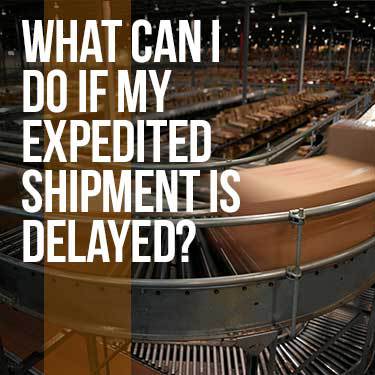
Even in today’s tricky freight market, expedited freight shipping lanes remain open and moving fast. The American Journal of Transportation maintains that expedited shipping services and carriers haven’t been hit as hard as traditional truckload and LTL carriers. This means that even in today’s world of freight delays, your expedited shipment should still move fast.
Expedited freight shipments move on the fast track. Trucks carrying expedited loads make very few stops while enroute, staying in motion from pickup to delivery. Your carrier is able to offer this accelerated service by working with trucking teams. Hastened service is offered because drivers work in shifts; one driver conquers the road while the other rests. This makes your shipment move fast and can seriously decrease transit times.
Quick-moving expedited shipments are essential to getting critical goods in the hands of people who need them on time. Expedited freight shipping is likely a good option for your business in a number of circumstances:
Regardless of the reason, your business needs to move expedited freight, the right shipping partner will ensure quick and timely delivery.
But what can you do if my expedited shipment is delayed? While this situation is unlikely, the best answer is to work with your carrier or freight broker partner. The right transportation company for your move will find ways to remediate the situation in a timely fashion. They might offer a discount on services if terms of the agreement were not met or they might seek to provide other solutions.
In most cases, you can track your expedited freight shipment as it travels over the road. This will help you ensure your delivery will arrive on time. Tracking your freight shipment will also help you prepare for delays in the rare circumstances in which they occur.

You might rely on freight shipment tracking to keep an eye on your cargo as it travels over the road. Tracking your shipment will give you peace of mind, letting you know that your freight is moving as it should and is set to arrive on time.
However, tracking your freight shipment can also help you prepare for any delays you might encounter. Freight shipment tracking can show you any obstacles along the way.
Most freight companies use software called Transportation Management Systems (TMS) to ensure shippers have access to real-time shipment tracking. This software is complex, but it allows carriers, freight brokers, and other transportation partners to save time and money along the way. Thanks to built-in APIs and interfaces, the TMS will also provide real-time transparency for the movement of freight.
The data provided by a carrier or freight partner’s TMS is accurate. The information comes from advanced software systems, which reduce human error and provide precise figures. Shippers can count on the accuracy of shipment tracking when working with a carrier with the right systems in place.
Updates shippers might receive from their transport partner’s TMS might include:
Accurate tracking information should let you know if your shipment is delayed before the scheduled date of arrival. Knowing about delays ahead of time can help you plan your shipment and make necessary arrangements.

Can you sue for late delivery? This is a complex question. The answer is simply, “it depends.” Only a lawyer or legal expert can provide an accurate answer to this question.
Generally speaking, in some cases, you might be able to sue for breach of contract in the case of late freight delivery.
Let’s say a widget manufacturer orders a truckload of parts from a third-party vendor. The vendor says the parts will arrive in 5 days. However, the parts arrive in 10 days. This might mean the contract has been broken. But can the widget manufacturer sue the vendor for the delayed parts? Again, it depends on the situation and circumstances.
If the widget manufacturer needed the parts to complete an urgent order and the delay caused them to lose that business, they might be able to sue the vendor or the shipper for the lost revenue. If the manufacturer was simply restocking their part supply and didn’t suffer any kind of financial or monetary loss because of the late delivery, they might not have a case in court.
Keep in mind that even if you decide to sue for a late freight delivery, you mind not win. And even if you do win the case, you might pay more in court costs than you recoup.
The intricacies of the law are complex. Additionally, laws vary by state and jurisdiction. The best way to determine if filing a lawsuit for late freight delivery is to work with a lawyer. Their legal expertise can determine the best option for your unique situation.
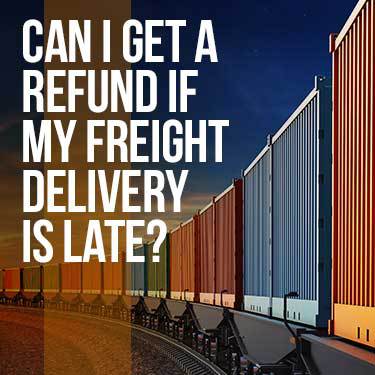
Can you get a refund if your freight delivery is late? Once again, this is a complex question. The answer can vary and it depends on each situation.
If your freight delivery does not arrive on time because the vendor was delayed in sending it, you might be eligible for a refund from the vendor. However, in many cases, you’ll only be refunded for the shipping costs -- not the cost of the products. Each vendor has its own policies, so you’ll need to work with your supplier to find a solution to your situation.
If the vendor refuses to refund you for shipping or product costs for late freight delivery, you might pursue seeking a refund for freight shipping costs from your carrier or freight broker. However, submitting requests for refunds can be quite tedious and time-consuming.
If your freight is seriously late and insured, you might be able to file a claim for non-delivery of goods with your carrier or freight broker. Insuring each shipment is essential and can come in handy in cases of loss, damage, or even late delivery.
Let’s break down what it takes to file a claim for late delivery.

If a significant amount of time has passed since your freight should have been delivered, you might be able to file a claim for late delivery or non-delivery of goods.
While each carrier and freight partner has varying individual policies, you do have rights as a shipper. Cargo claims and cargo insurance allow you to make sure you are compensated in the case of visible loss or damage, concealed loss or damage, and non-delivery of goods. In the case of an extremely late delivery, you might be able to file a claim for non-delivery of goods.
You’ll need to have the right cargo insurance to file a claim for non-delivery of goods. Most freight brokers and carrier partners have limited liability. This is why your broker agent or carrier agent likely asked for the value of your shipment when you got your freight rate quote. You likely purchased additional cargo insurance to cover this value in case of any kind of loss or damage, including non-delivery of goods.
One important thing to keep in mind when filing a claim for non-delivery is that most carriers and freight partners will not cover damages related to things totally out of their control. Your carrier partner or freight broker likely won’t accept responsibility for events like “acts of God,” acts of public enemies, strikes, riots, wars, weapons explosions, weather, and other factors. Again, these are among the reasons why cargo insurance is essential.
To file a claim for non-delivery of goods, you’ll need to submit your cargo claim within 4 months (120 days) of the date on the waybill or wait a reasonable time after scheduled delivery to lapse.
You’ll need a few important documents when filing a claim for non-delivery of goods. Your carrier partner or freight broker will likely need:
Freight carrier partners and freight brokers will likely only consider your claim for non-delivery of goods if all of the necessary information is presented. It is wise to double-check with your transportation partner to make sure all demands are met and information is provided before filing a cargo claim.
After your claim is received, you will likely be assigned a claim number. Your carrier partner or cargo insurer should respond to your claim in a timely manner, often within less than 30 days. In many cases, payment for your eligible claim will be timely as well -- often within less than 120 days of your date of claim.
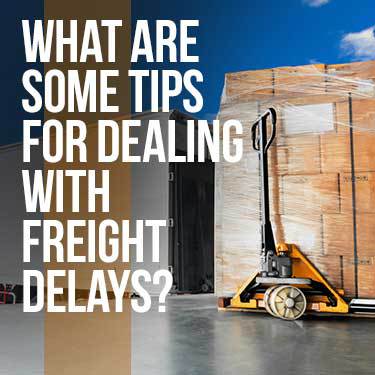
Freight delays are increasingly common and significant inconveniences. However, there are a few things you can do to make dealing with freight delays a little easier.
If your freight shipment is seemingly delayed, you’ll need to ask yourself a few questions to determine how to best deal with the situation. These questions can include:
If you can answer “yes” to these questions, you are might be able to seek damages or compensation for your delayed freight. If you answer these questions “no,” it is important to remember that the carrier or freight broker is likely not liable for the freight delay.
How you choose to deal with your freight delay might vary based on how you can answer the above questions. Regardless of your situation, there are a few things you can keep in mind to take the sting out of freight shipment delays.
Consider keeping the following five tips for dealing with freight delays in mind:
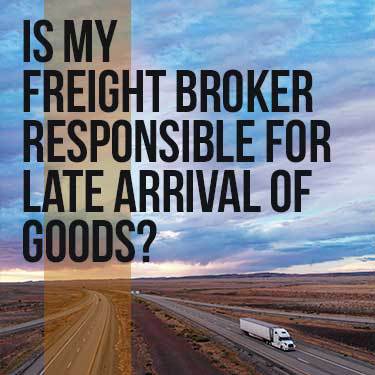
In a majority of cases, you’ll likely find that the late arrival of goods has little to nothing to do with your freight broker. In fact, your freight broker is an agent on your side. Your freight broker is dedicated to making sure you get the best service possible from the carrier or other transportation partner.
When determining if your freight broker is responsible for the late arrival of goods, keep the following thoughts in mind:
If you are concerned about freight shipping delays, your broker is likely able to provide answers and solutions. Let your transportation partner be a strategically and help ensure your shipment arrives on time even during times of uncertainty and adverse market conditions.
Robert Bowman, President of R+L Global Logistics, has some advice for those who want to avoid delayed freight with their next shipment.
“My number one piece of advice to shippers who don’t want to see freight delays is to work with a strong logistics ally and let them do all the work,” Mr. Bowman said. “Look at their track record on on-time freight, their network of carrier partners, their accreditations, and their reputation in the industry.”
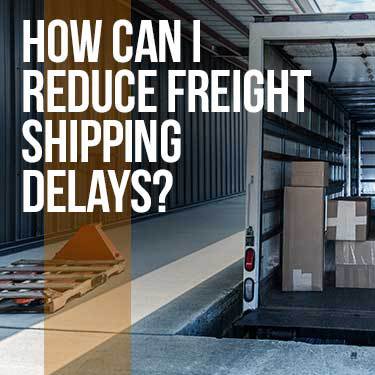
In some cases, freight shipping delays are simply part of doing business. You might anticipate potential delays when planning your shipments, especially during peak shipping season and when times are tricky in the trucking industry.
A little flexibility goes a long way when dealing with freight shipping delays. Being prepared for how freight delays might impact your business and your customers is essential.
Let’s take a look at a few things you can do to avoid or reduce freight shipping delays.
Peak shipping season often means crowded ports, overwhelmed terminals, and possible delays. If the timing or seasonality of your shipment isn’t a determining factor, consider avoiding shipping during the peak shipping season.
For many shippers and carrier partners, August through October is prime shipping time. It is during these months that consumer demand for products rises. From back-to-school shopping in August and September to holiday shopping creeping into October, products flow from port to terminal to warehouse to retailer during these busy months.
Not only can you reduce freight shipping delays by avoiding peak shipping season, but you’ll also likely save a little money. Capacity gets even tighter and sends prices up during the busy shipping season.
In addition to peak shipping season, other factors that can further tighten capacity and cause freight delays are product launch dates and commodity seasonality.
For example, new electronic products and appliances are typically in stores for consumers in early fall, around the holidays, and in the spring. This means more products moving over the road and tighter capacity for trucks.
Paying attention to the little details like launch dates and seasonality can help keep your products moving without delay.
In today’s saturated transportation marketplace, it can be difficult to find the right broker partner. When seeking out a freight ally, look for a company with a strong track record of performance.
For example, R+L Global Logistics only works with the best carriers on the roads today. This translates to a 99.5% on-time delivery rate for customers. Seek out a freight partner ready to serve as your strategic partner and offer solutions even during these unprecedented times.
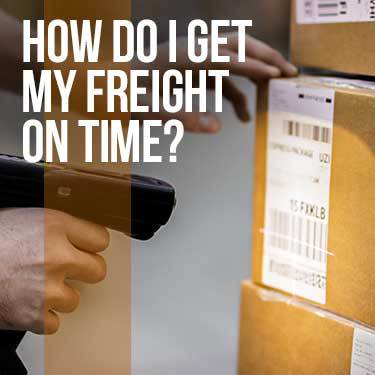
There are many factors that can determine whether your freight arrives on time. In 2021, delays are being caused by the COVID-19 pandemic; shrinking capacity; driver shortages; crowded ports; backed-up terminals; supply chain disruptions; and more.
Despite the obstacles, most shipments will arrive on time. This is especially true when you have the right freight partner on your side.
One way you can ensure your freight arrives on time is to be fully aware of transit times. When you’re shipping freight over the road, it is important to be aware of how full truckload and LTL transit times can vary. Expedited freight is an option to consider, too. Choosing the right mode of shipping can help you make sure your freight arrives on time,
A full truckload shipment is just as it sounds -- one shipment occupies one truck. This means every crate or pallet on the truck has the same sender and the same receiver. This also means that your shipment will stay on the same truck from dispatch to delivery. Goods won’t be transferred from terminal or terminal, which lessens the risk of damage along the way.
Because your truckload shipment is in one dedicated truck, it is generally a faster shipping option. If you want to get your freight on time, truckload shipping might be your best bet.
LTL, or less than truckload, shipping is also just as it sounds. You might use LTL shipping if you are only moving a few pallets of goods. Your LTL shipment might be transferred from truck to truck and terminal to terminal as it makes its way from dispatch to delivery.
The change of hands creates additional opportunities for damage and delays. If getting your freight on time is a top priority, you might consider avoiding a traditional LTL shipment for your freight. LTL freight is often much cheaper than dedicated truckload freight, so you might consider this option is budget is a bigger concern than timeliness.
If time is of the utmost importance for your freight shipment, consider booking an expedited shipment. Interestingly enough, even as LTL shipments face delays, expedited shipping lanes remain free-flowing and fast.
Expedited freight can be among the most expensive shipping options. You might use expedited freight service when your shipment is of critical importance.
In addition to choosing the right freight shipping service, having the right information ready can also help your freight arrive on time.
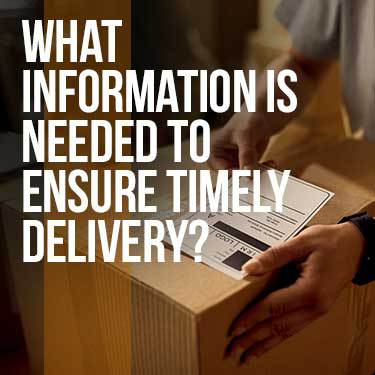
You’ll be asked a host of questions when you reach out to a transportation partner to get a freight rate quote. It might feel like an interrogation, but it is important to trust the process. There is a method to the madness. All of the questions your freight broker or carrier agent is asking are designed to make sure your shipment arrives on time.
If you have this information ready when you reach out for a freight quote, your broker or agent will be able to provide the best service possible. This will help ensure timely delivery and avoid fright delays along the way.

There are a number of things businesses can do to avoid freight shipping delays. From working with the right freight partner to avoiding shipping during peak season, a little bit of planning and preparation can go a long way in avoiding shipping delays.
Some of the obstacles causing shipping delays are unavoidable. The COVID-19 pandemic and the limited workforce it has brought are plaguing almost every industry -- including freight shipping and transportation. Weather can be unpredictable and is always out of your control. Brokers and carriers can’t increase capacity unless more drivers and trucks decide to hit the road.
Even with the forks in the road mentioned above, you have some options with it comes to reducing freight shipping delays. Let’s look into a few of the workarounds shippers might be able to use as a solution to shipping delays.
You know to avoid shipping during the peak season to help prevent delays. This is a smart move as it will not only prevent delays caused by crowded terminals and tightened capacity, but can also save you money on freight shipping costs.
Planning your freight shipments during the off-season will help your goods avoid freight delays by keeping them out of an overwhelmed and overburdened system. You also might be able to prevent delays by planning your shipment far enough out with a time cushion for potential delays.
Choosing the right freight shipping service is essential to preventing delays and getting your freight on the go.
There are 3 common freight shipping services you might consider taking advantage of:
Of course, there are other specialized freight services that apply to other freight shipping services. You might find you need heavy haul trucking, HAZMAT carriers, flatbed carriers, or even white glove delivery depending on your shipment requirements.
You’ll be asked a long list of questions when you reach out to a freight broker or carrier partner. Don’t be alarmed, it is just part of the process. Having answers to these questions ready will help your transportation ally provide the best service possible.
When you’re scheduling your shipment with a freight broker or carrier agent, make your expectations for the dispatch and delivery dates explicitly clear. If your broker has clearly defined and stated expectations for pick-up and delivery of your freight shipment, they might be liable for any freight shipping delays and will do their best to ensure delays are avoided.
Today’s economy as a whole and the transportation industry are seeing unprecedented changes because of the worldwide COVID-19 pandemic. Though the workforce is down and trucking capacity is tight, consumers are becoming more confident and demand for all kinds of products is rising.
Doing business in today’s extraordinary time merits patience and understanding. Keep this in mind as a consideration when booking freight and facing possible delays. In almost all cases, any freight delays are out of the hands of your freight broker or carrier.
One of the most important things you can do when trying to avoid freight delays is work with trusted a freight partner or carrier. You want to choose a freight partner with a great track record of on-time delivery and who has a strong capacity to make goods move.
One major player in the freight shipping game, FedEx, is still experiencing unprecedented delays even as Summer 2021 rolls around. According to a May 2021 report from the Wall Street Journal, FedEx only sees 85% of shipments arrive on time. The company blames the delays on an e-commerce surge.
However, other freight companies are able to maintain shipping speeds. R+L Global maintains a 99.5% on-time delivery rate for truckload freight shipments, even has other carriers fail. Find a strategic partner with a strong track record and avoid delays.
As 2021 pushes into mid-summer, freight delays are still a common occurrence. Shipping carriers experience delays and those often extend to B2B and B2C retailers, and then ultimately to consumers.
Customers of Wayfair, an online seller of furniture and home goods, are seeing unprecedented delays. Wayfair often relies on LTL freight shipping to move large items to homes and offices. In fact, 27.8% of all Better Business Bureau complaints about Wayfair are related to delivery issues. Many of the issues experienced stem from freight delays and postponed deliveries.
Apple is also experiencing shipping delays in June 2021. The company is relying on container transport and air freight to move goods quicker, but end consumers are still seeing goods arrive significantly behind estimated delivery dates.
It is a fact: many shippers saw freight delays in 2020 and are even seeing freight delays into Summer 2021. How long are the freight delays expected to last? While no one was a crystal ball that can guarantee the future, some market insiders have made a few predictions.
Reports indicate that rates, volumes, and employment within the trucking industry have been climbing since Summer 2020. This is positive news, as it shows the industry is on the rebound from the dip seen earlier in the pandemic. In fact, reports from the Journal of Commerce suggest that retailers are seeking to replenish inventory from imported stock, which leads to more trucks on the road moving freight from the nation’s ports.
While more freight on the road might mean tighter capacity, it also might mean there is an end in sight. Some trucking industry pundits have expressed that they expect the industry to remain volatile through Summer 2021, then return to pre-pandemic levels.
Shippers can drive through the current freight market by keeping some information in mind. Some ways to navigate the freight market include:
With the above strategies in mind, your business should be able to weather any changes in the trucking industry and avoid delays over the next few months.
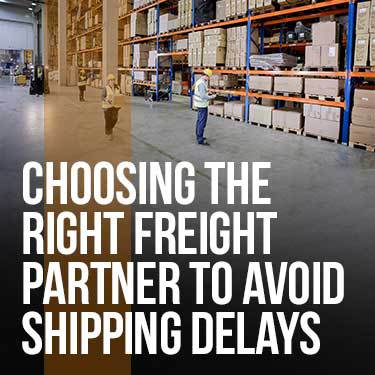
What’s the most important thing your business can do to avoid freight shipping delays? The answer is simple. Align yourself and your business with the best freight partner in the industry.
There’s a lot to be said about working with the right freight partner when it comes to avoiding delays. Robert Bowman, President of R+L Global Logistics, is ready to step up to the challenge for the businesses who chose to ship freight under his company’s care.
“R+L Global Logistics seeks to be a strategic ally and is ready to meet all of your business’s logistics needs,” Mr. Bowman said. “We only work with the best carriers on the road today, take advantage of the latest technology, and have numerous systems in place ensure quality, on-time service.”
You’ll find that R+L Global Logistics has and maintains a 99.5% on-time delivery rate. That means that even in today’s tricky trucking market, we’re here to provide solutions and keep the freight flowing. This will ensure your supply chain stays strong from start to end, along with every link in between.
As an expert freight partner, R+L Global Logistics is ready to be your strategic ally. There are many trucking companies and freight brokers available to shippers today, but you’ll find we only work with the best to provide unparalleled service. You’re more than an algorithm to R+L Global Logistics, as when you reach out to us you’ll get a freight quote from a live, friendly agent with expertise in truckload shipping, LTL shipping, and other freight options.
Freight services offered by R+L Global Logistics include:
This vast array of services means that R+L Global Logistics can provide full-scale logistics services tailored to your business needs. We can even have partners ready to help with customs clearance, cross-border freight, ocean freight, fulfillment and distribution, warehousing, and more. No operation is too large or too small for R+L Global Logistics, as our scalable solutions are right for almost any business.
Get your next truckload shipment moving without freight shipping delays. Reach out to R+L Global Logistics by phone at (866) 353-7178 today. We’re ready to align our services to your business needs and build a strategic partnership.
R+L Global Logistics
315 NE 14th St., Ocala, FL 34470